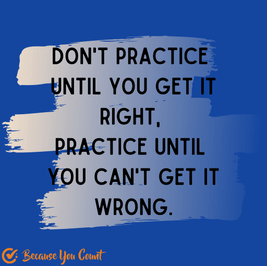What will make the difference?
The unmistakable sinking feeling when you read a question and no matter how hard
you try, you can’t recall the answer. The blank space on the page stares back
at you, unblinkingly, waiting for you to write something, anything. But nothing
comes.
It’s a common experience for students during exams. They know they’ve heard or read
information relating to the question but no matter how hard they try, they can’t bring it to mind. As the pressure piles on and stress levels rise, it becomes even harder to answer the question and any others.
Exams aren’t the only situation where this can happen.
At every stage and phase of life, you’re learning new information that can quickly and
easily be forgotten, especially in pressure situations. That’s frustrating and can really undermine your confidence. So, learning how to retain information and recall it with ease is worthwhile.
What is learning retention?
“Learning retention” is remembering what you’ve learnt and being able to recall it
quickly and easily when it’s needed.” Jean McKenzie, founder of Impact Tutoring
But it won’t just happen.
Retaining information or “deep learning” as Jean refers to it as, is an active process
where you engage in activities that move information from your short-term
memory to your long-term memory. Once there, you can access it as required,
even when you’re under pressure like during exams or an assessment.
Imagine what could change for you if you were able to recall information at any time?!
No more staring at a blank page or wishing the ground would open up and swallow you
when you can’t remember what the answer is.
Before sharing the key to retaining information, let’s look at some research that reinforces why learning how to retain information is so important.
Why does learning retention matter?
In the late 19th century, Hermann Ebbinghaus developed the “Forgetting Curve” to
explain what happens when you learn new information.
His work showed that when no effort is made to retain new information, 70% of it is lost
within 24 hours. And by 7 days, if no further action to reinforce the learning has been taken, you’re likely to have retained less than 10% of the information.
Those are staggering statistics because you can spend a lot of time learning, and if
you’re not moving what you learn into your long-term memory, it’s going to feel like you’re wasting your time. And that’s just going to add to the stress you might be feeling!
What’s stopping you from retaining information?
In Jean’s view anyone can retain information but there are two main hurdles that get in
the way of being able to remember and recall information.
Firstly, there’s an assumption that everyone knows how to learn. But think back to when
you were at school – were you taught how to learn? Most commonly the answer is “no”.
So, it’s no surprise that you’re not retaining information! It’s time to ditch the
assumption and make sure people, of all ages, are taught how to learn so they
can remember and recall information.
Firstly, there’s an assumption that everyone knows how to learn. But think back to when
you were at school – were you taught how to learn? Most commonly the answer is
“no”.
So, it’s no surprise that you’re not retaining information! It’s time to ditch the
assumption and make sure people, of all ages, are taught how to learn so they
can remember and recall information.
“We need to not only teach information but teach how to retain information.” - Jean
McKenzie, founder of Impact Tutoring
The second hurdle is there’s simply so much information to get through in the
school curriculum and not enough time for students to embed what they’re
learning. And it’s not just at school where this is an issue. From a work
perspective, there’s often a lot of change happening and plenty to stay up to
date with too.
“In a world that’s getting increasingly busy and fast-paced and where there’s always
something else to get on with, there’s simply not enough emphasis being put on
deep learning”, says Jean. But it’s important to move new information to our
long-term memory if we’re to be successful in school, work and life in general.
How do you retain information?
Based on her many years of experience in the education sector, Jean has identified the
key to retaining information as being … practice.
Information will only move into your long-term memory through repetition and there’s no
short-cutting or hacking your way around that!
“In the classroom, new information is often delivered at a fast pace, so students don’t
get time to practice. The same can happen in a workplace. But in a tailored
tutoring situation, we ensure there’s plenty of time for students to practice and for feedback to be provided”, says Jean.
Now for anyone thinking that practice is just about doing a few exercises and that’s it – well, there’s more to it than that.
It’s important to continue practicing until the information is embedded and you’re
able to recall it with ease. (and by the way, quizzes are great for checking
retention and identifying skill gaps).
Jean shared a great example of the power of practice from her own life.
As a volunteer firefighter, she takes part in weekly training sessions even though
she’s been in that role for 15 years. Many of the situations Jean and the rest of the volunteer crew find themselves in are high-pressure, so the regular practice means they know what to do and get straight into it.
Another example would be a high performing sports team like the All Blacks or Silver
Ferns.
The players don’t just show up on game day and hope that everything goes well. No
matter how experienced they are, the players attend training sessions. It’s the
practice that means, come game day, they know what to do and can perform under pressure.
To avoid that sinking feeling of not being able to recall something you’ve learnt, commit to practicing. It might not sound like the coolest thing to do but when it comes to achieving success, it’s key.
You now know it’s possible to retain and recall information, even in pressure
situations, but it won’t just happen. Use what you’ve learnt about the power of
practice and put it into action
. Because it’s practice, practice, practice, that will make the difference!




